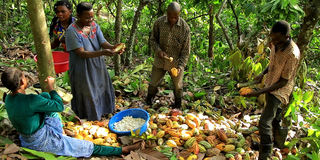Cocoa theft leaves farmers sleepless

Cocoa farmers sort out their produce in Bundibugyo District at the weekend. Photo/ALEX ASHABA
What you need to know:
- Mr Paul Murungi, the district agricultural officer, explains that the high demand for cocoa in the global market coupled with reduced supply from leading producing countries in West Africa has contributed to the surge in prices.
- The farmers say the rise in theft has forced some to harvest immature cocoa to mitigate potential losses.
For the past three months, cocoa farmers in the Bundibugyo District have endured sleepless nights as they guard their gardens against a growing wave of theft.
With cocoa prices increasing from Shs6,000 to Shs35,000 a dry kilogramme for the first time in more than 10 years, suspected thieves have been emboldened to invade their farms, seeking to profit from the newfound value of the produce.
According to farmers, this surge in prices marks the first time they have experienced significant profits from the cash crop.
However, they also lament the rise in theft has forced some to harvest immature cocoa to mitigate potential losses.
Mr Amosi Asaba, the Kakoba Village chairman, says she has received numerous complaints from farmers whose cocoa gardens have been invaded by thieves.
He adds that to combat the theft, some farmers have formed security groups called Wembley to patrol their villages throughout the night.
Thieves reportedly sell freshly stolen cocoa for prices ranging from Shs7,000 to Shs10,000 per kilogramme and Shs35,000 for dried produce.
Mr Vincent Nkabibwa, a member of the Wemble security group, acknowledges that despite their efforts, theft persists, often involving collaboration between local youth and outsiders.
He says whenever they go for an operation between 7pm and 7am, they are armed with pangas and spears. He adds that even the owner of a garden has no access and that in case he is found there, he is arrested.
“We made our bylaws as a security group together with all village members. If we catch anyone trespassing in someone else’s garden at night, we arrest them and hand them over to the village chairman. In the morning, they are charged. If caught stealing, the fine is Shs500,000,” he says.
He further says all village members are required to sign the bylaws to allow them to start working.
“We don’t earn any monthly salary. Instead, we agreed with all the farmers at the start of the harvesting season that each farmer has to give two cups of fresh cocoa beans. We collect and later dry them before selling,” he adds.
Mr Paul Murungi, the district agricultural officer, says the rising instances of theft are particularly among youth without cocoa plantations.
Mr Murungi adds: “We indeed have cases of cocoa theft, but in some instances, farmers are stealing from their gardens because they previously sold them to businessmen when their cocoa plants were still at the flowering stage. At that time, they were selling cheaply, unaware of the impending price increase. Now, they feel cheated.”
Why price increase
Mr Paul Murungi, the district agricultural officer, explains that the high demand for cocoa in the global market coupled with reduced supply from leading producing countries in West Africa has contributed to the surge in prices.
‘‘Cocoa-producing nations such as Cameroon and Ivory Coast have seen a decline in their production. They are currently implementing policies to rehabilitate old cocoa trees, a process that could take two to three years before they can re-enter the market, as cocoa trees typically take three years to yield again,’’ he says.
He further notes that these countries have also faced outbreaks of diseases affecting cocoa plants, further impacting their production, and says this situation has positioned Uganda as a leading cocoa producer.
‘‘Our Ugandan cocoa stands out for its high quality. It is grown naturally without the use of harmful chemicals or fertilisers, making it organically produced and all buyers are now coming to Uganda,’’ Mr Murungi says.
Mr Murungi advises farmers to maintain field hygiene in cocoa gardens, warning that failure to do so could result in plantations being vulnerable to pests and diseases, ultimately affecting production and profitability in future.




